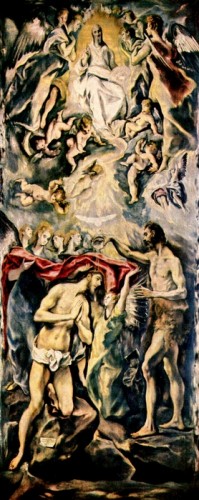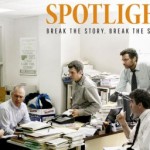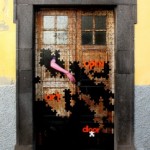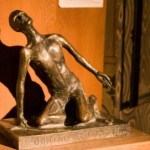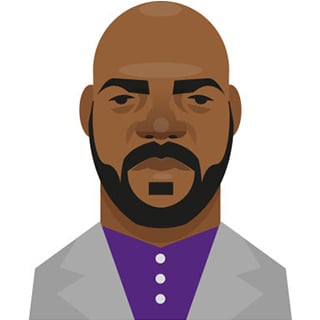Advent 2
may choose to flare suddenly at my elbow,
I only know that a rook,
ordering its black feathers,
can so shine as to seize my senses
and grant a brief respite from fear.
–Sylvia Plath
Wildman John leaps into Advent’s second Sunday, taking my breath away with his matted black dreadlocks, that camel skin he wraps around his bony body, gnarled bare feet sticking out below. His eyes seize me the way his rough hands seize the locusts he eats, the honey he snatches from wild bees. He roars warnings: dire times, dereliction of duty, the brink of doom. Advent seems too small a stage to hold him.
He roars because the feathers he seeks to order are on plumed and manicured people in the city he has abandoned. The city, where life is contrived, where truth is artifice; the wilderness, where godly design is discernible still. John is a wilderness man now. And John roars because the crowds that come out to hear him are immense, multi-national, multi-lingual, even multi-faithed, according to the Roman historian for the region. They come because the Wildman speaks the truth they long to hear.
The Bible only records two conversations in which Jesus talks about his ministry. John’s is the first and comes as the opening event. Pilate’s is the second, and comes at the end. So John and Pilate bracket Jesus’ work. And both of them ask Jesus to tell them the truth.
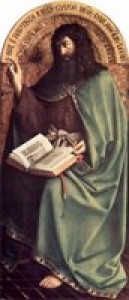
Jesus tells Pilate he has come into this world to speak the truth, and people of truth will respond to him. John, too, has this purpose. And Luke, as if to underline that purpose, places John in the context of very powerful leaders, secular and religious, whose reputations are for lying, distortions, scandal, greed.
In the fifteenth year of the reign of Emperor Tiberius, when Pontius Pilate was governor of Judea, and Herod was ruler of Galilee, and his brother Philip ruler of the region of Ituraea and Trachonitis, and Lysanias ruler of Abilene, during the high priesthood of Annas and Caiaphas . . . Luke writes that this is John’s time.
In this time, when these leaders lack courage, conviction, strength of will, vision, stamina with which to lead their people, Luke writes that John is as clear as a bell about the truth. The people are walking in deep darkness, and longing for light.
The wilderness is a world shaped by God’s will, steeped in God’s goodness, felt in rhythms that design life. Immersing himself in these, John begins to speak words formed from beyond the schooled, spun, media-shaped, mind-set of the human metropolis. He will pay for his voice with his life.
![]() To know God means to know what has to be done, wrote Emmanuel Levinas, French Jewish philosopher. I find myself wanting to qualify that definition because I’ve had days, and more than a few, when Pilate’s sense that truth is elusive and out of focus has been mine. But I’ve also had moments like John’s, when I’ve known what I needed to do and how to proceed, come what may. And who can say how such clarity comes into us, where it comes from within us or whether it comes from beyond us, and who can say when such moments will arrive?
To know God means to know what has to be done, wrote Emmanuel Levinas, French Jewish philosopher. I find myself wanting to qualify that definition because I’ve had days, and more than a few, when Pilate’s sense that truth is elusive and out of focus has been mine. But I’ve also had moments like John’s, when I’ve known what I needed to do and how to proceed, come what may. And who can say how such clarity comes into us, where it comes from within us or whether it comes from beyond us, and who can say when such moments will arrive?
But that wilderness is a good place to look for such moments, many say. Mary Oliver, the Cape Cod poet, writes Everyday I’m still looking for God and I’m still finding him everywhere, in the dust . . . . Wendell Berry, the Kentucky farmer poet, writes:
When despair for the world grows in me
and I wake in the night at the least sound
in fear of what my life and my children’s lives may be,
I go and lie down where the wood drake
rests in his beauty on the water, and the great heron feeds.
I come into the peace of wild things
who do not tax their lives with forethought
of grief. I come into the presence of still water.
And I feel above me the day-blind stars
waiting with their light. For a time
I rest in the grace of the world, and am free.
That John found his truth in the wilderness, and that people heard and responded to 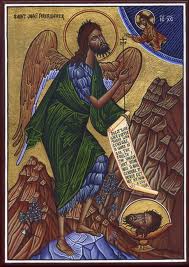 the truth he spoke there, rings true. That the Child of Bethlehem will be born among animals, and that only shepherds who sleep in open fields among animals will get to see this Child, rings true. That Martin Luther one night saw the word of God in a fir tree with stars shining in its branches, and heard that word so powerfully that he brought a tree into his house and placed candles on it so his family could hear it too, rings true. That a rook, ordering its feathers, can seize our senses and grant a brief respite from fear, rings true. That all of this, the Wildman, the stable, the fields of Bethlehem, the telling of truth, is awash with angels, rings true to me, as true as dawn hovering at the edge of darkness.
the truth he spoke there, rings true. That the Child of Bethlehem will be born among animals, and that only shepherds who sleep in open fields among animals will get to see this Child, rings true. That Martin Luther one night saw the word of God in a fir tree with stars shining in its branches, and heard that word so powerfully that he brought a tree into his house and placed candles on it so his family could hear it too, rings true. That a rook, ordering its feathers, can seize our senses and grant a brief respite from fear, rings true. That all of this, the Wildman, the stable, the fields of Bethlehem, the telling of truth, is awash with angels, rings true to me, as true as dawn hovering at the edge of darkness.
Here, then, comes Wild John, his Voice crying out: Prepare the way of the Lord. Every valley shall be filled, and every mountain and hill shall be made low, and the crooked shall be made straight, and the rough ways made smooth; and all flesh shall see the salvation of God.
______________________________________________________________Illustrations:
1. Baptism of Christ, by El Greco. 1596-1600. Museo del Prado. Madrid, Spain. Vanderbilt Divinity School Library, Art in the Christian Tradition.
2. Altar of the Mystical Lamb- John the Baptist. Ghent Altarpiece by Jan van Eyck. Ghent, Belgium. Vanderbilt Divinity School Library, Art in the Christian Tradition.
3. Beheading of John the Baptist. Icon. Image from Wikiwand, free public images.
4. Greek Orthodox Icon of John the Baptist. Image on page of St. John Baptist Greek Orthodox Church, Pueblo, Colorado, in an article on understanding Greek icons.

